Mali
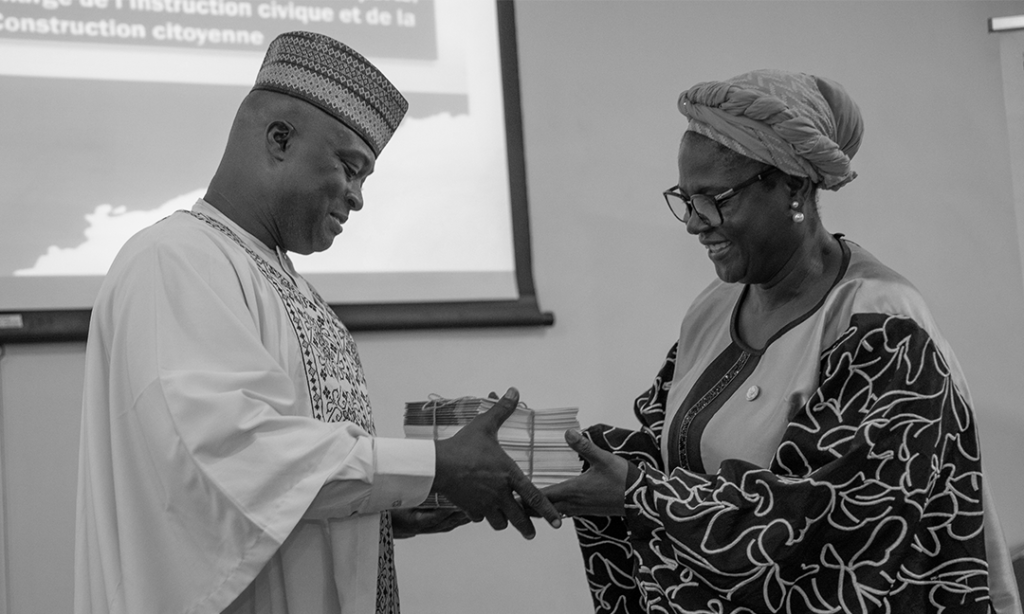
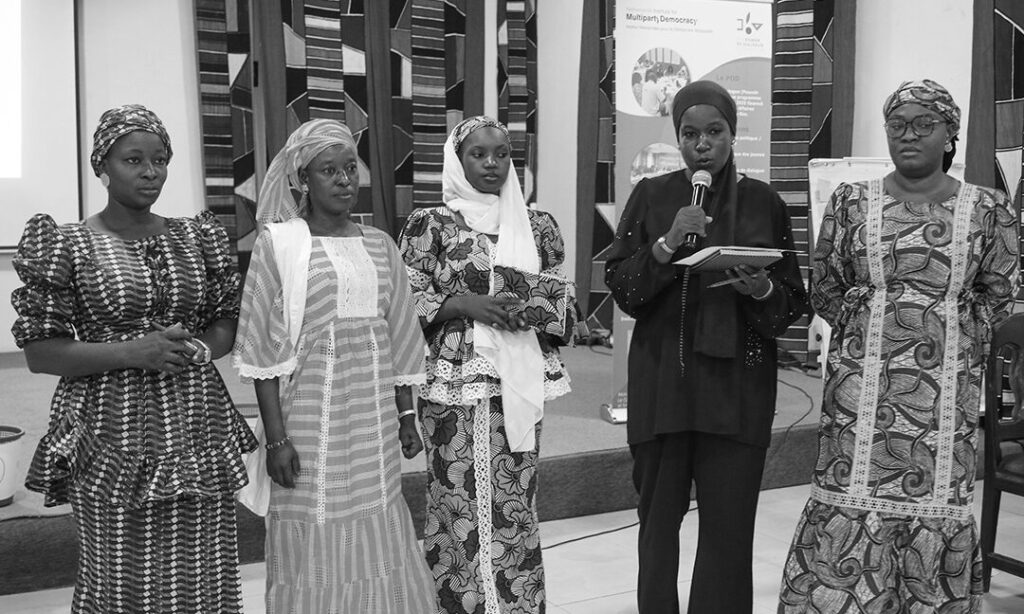
- NIMD in Mali: In een oogopslag
- Wat we doen
- Hoe we het doen
- Maak kennis met het team
Hoofddoel
Het vertrouwen in de politiek bevorderen en de stemmen van verschillende groepen in heel Mali bundelen om de weg vrij te maken voor een meer inclusieve, vreedzame en democratische samenleving.
Resultaten
Sinds het begin van de democratische transitie in Mali heeft NIMD input verzameld van meer dan 20.000 burgers uit het hele land via online en persoonlijke forums. Deelnemers hebben hun mening gegeven over de overgang, de rol van politieke partijen en hoe het verkiezingsproces de basis moet leggen voor duurzame stabiliteit. We zijn vastbesloten om deze perspectieven te delen met nationale beleidsmakers om ervoor te zorgen dat de stem van de mensen wordt meegenomen in de politieke, electorale en institutionele hervormingen op de transitieagenda. Meer lezen.
In 2021 hielp NIMD bij de oprichting van een partijoverstijgende adviesraad van politieke, burgerlijke en academische leiders genaamd de Comité de Plaidoyer et de Suivi des Réformes Électorales (CPSRE). Na de staatsgrepen heeft de CPSRE de dialoog over de verdeeldheid zaaiende grondwetshervorming in Mali gefaciliteerd en gezorgd voor inclusieve bepalingen in de hervormingen van de kieswet, waaronder de oprichting van een onafhankelijk verkiezingsorgaan in Mali. Door verschillende groepen samen te brengen om een consensus te bereiken en geschillen aan te pakken, bevordert het initiatief vertrouwen, inclusiviteit en democratische waarden. Meer lezen.
Jongeren maken bijna 80% van de bevolking van Mali uit en velen willen graag bijdragen aan de democratische transitie van hun land. Thoedwaarom NIMDpartners het ministerie van jeugd en sport gesteund in organisereneen grote uitwisseling tussen 40.000 jongerenin 600 gemeenten, 19 regio's en via 31 diplomatieke vertegenwoordigingen in de diaspora. Na een diagnose en reflectie op de zorgen van jonge Malinezen presenteerden de deelnemers hun lijst van 256 aanbevelingen aan de hoogste autoriteiten van het land, waaronder de president van de overgangsperiode. Lees meer.
Mali: politieke achtergrond
Sinds NIMD in 2018 ons kantoor in Mali opende, heeft het land te maken gehad met conflicten, intense politieke onrust en twee staatsgrepen. Momenteel staat Mali onder militair bewind, met plannen voor een overgang naar democratie en verkiezingen gepland voor 2025. Het politieke klimaat blijft gespannen, met vragen over de inzet van het leger om de macht terug te geven aan de burgers en voortdurende onveiligheid. Tegelijkertijd is het vertrouwen tussen de politieke klasse en de bevolking aangetast door armoede en beperkte toegang tot basisvoorzieningen voor grote delen van de bevolking.
In deze context is de overgang naar democratie een delicaat en complex proces, dat wordt bepaald door concurrerende belangen en uiteenlopende verwachtingen. Het opbouwen van vertrouwen en het vinden van een gemeenschappelijke basis tussen politieke actoren - en tussen de staat en zijn burgers - is cruciaal om dit proces een kans op succes te geven. Dergelijke inspanningen hebben het potentieel om een basis voor stabiliteit te creëren en mensen hoop te bieden dat ze actief vorm kunnen geven aan een betere toekomst in hun eigen land.
Wat we doen
NIMD is sinds 2002 actief in Mali en werkt samen met publieke en politieke actoren en maatschappelijke organisaties. In 2018 openden we een speciaal kantoor in Bamako.
Ons vroege werk in Mali was gericht op het bevorderen van de dialoog tussen verschillende politieke partijen. In de loop der tijd hebben we onze aanpak voortdurend aangepast aan de veranderende context.
Nu Mali van een coup in 2021 op weg is naar verkiezingen, geloven we dat de sleutel tot duurzame vrede en stabiliteit ligt in een inclusieve politiek waarin mensen zich vertegenwoordigd voelen. Daarom is ons werk vandaag gericht op het opbouwen van vertrouwen en het versterken van de stemmen van verschillende groepen in het hele land, om ervoor te zorgen dat iedereen een stem heeft in het vormgeven van de toekomst van Mali.
Door middel van dialoog verzamelen we verschillende perspectieven en meningen, zodat deze kunnen worden meegenomen in het overgangsproces en de toekomstige democratie. Tegelijkertijd bouwt onze dialoog een cruciale vertrouwensband op tussen de bevolking en hun politieke vertegenwoordigers.
In een land met een jonge bevolking geloven we ook dat het ondersteunen van een nieuwe generatie bij het nastreven en verwezenlijken van hun politieke aspiraties cruciaal is voor het opbouwen van een solide democratische toekomst. Onze school voor democratie biedt een veilige ruimte voor jonge opkomende politici en vertegenwoordigers van maatschappelijke organisaties om de kennis en essentiële vaardigheden te ontwikkelen die ze nodig hebben om hun stem te laten horen in de politiek.
Tot slot erkennen we de waarde van regionale samenwerking en bouwen we voort op de inzichten en connecties uit onze programma's in Niger en Burkina Faso. We brengen ook politieke en burgerleiders samen over geografische scheidslijnen heen, creëren mogelijkheden voor hen om gedeelde uitdagingen te identificeren, praktische oplossingen uit te wisselen en een gevoel van collectief doel op te bouwen. Deze regionale samenwerking bevordert solidariteit en gecoördineerde benaderingen om de complexe realiteiten en gedeelde strijd van de Sahel-regio aan te pakken.
We bouwen vertrouwen op en versterken de stem van verschillende groepen, zodat iedereen een stem heeft in het vormgeven van de toekomst van Mali.
Wat we doen: In cijfers
Hoe we het doen
Dialoog
NIMD heeft een geschiedenis in het ondersteunen van de dialoog tussen verschillende politieke actoren in Mali. In 2008 hielpen we bij het opzetten van een van de eerste onafhankelijke dialoogplatforms voor politieke partijen in het land, het Malien Centrum voor Interpersoonlijke Dialoog en Democratie (CMDID).
Terwijl Mali de overgang van een militair bewind naar democratie doormaakt, gebruiken we onze ervaring om vertrouwen op te bouwen en stemmen te versterken, om zo de kloof tussen mensen en hun politieke vertegenwoordigers te overbruggen.
Diverse stemmen benutten en versterken
Traditioneel bestaat er in Mali een grote kloof tussen de overheid en de bevolking, met weinig formele rol of mogelijkheid voor burgers om veranderingen in de wetgeving voor te stellen. NIMD heeft ernaar gestreefd om innovatieve manieren te vinden om mensen van alle achtergronden bij het overgangsproces te betrekken. Eén initiatief genaamd #MaTransition zag ons samenwerken met blogplatform Benbere om sociale media te gebruiken om de meningen en hoop van meer dan 20.000 mensen te verzamelen na de coup van 2020.
Deze inspanning wordt voortgezet via onze Volksvergaderingen, een reeks bijeenkomsten die sinds medio 2023 worden gehouden om de dialoog te bevorderen en Mali voor te bereiden op toekomstige verkiezingen. Zelfs te midden van onzekerheden over de verkiezingstijdlijn, verzamelen deze sessies de perspectieven van mensen op de rol van politieke partijen in het versterken van het democratische systeem van Mali en hoe het verkiezingsproces kan bijdragen aan stabiliteit op de lange termijn. We zetten ons in om deze perspectieven over te brengen aan nationale besluitvormers, zodat de stem van de bevolking wordt meegenomen in de hervormingen van het kiesstelsel.
Vertrouwen opbouwen
Tegelijkertijd zien we onze dialoog als een belangrijke kans om vertrouwen en respect op te bouwen, wat van vitaal belang is voor de stabiliteit op lange termijn in Mali. We organiseren bijvoorbeeld regelmatig informele dialoogbijeenkomsten onder de naam Politieke cafésDeze bijeenkomsten brengen politici en mensen uit het maatschappelijk middenveld bij elkaar om te netwerken en banden te smeden over ideologische scheidslijnen heen. Deze bijeenkomsten zijn meer dan gesprekken - ze creëren een veilige ruimte voor samenwerking, moedigen wederzijds begrip aan en cultiveren een cultuur van inclusieve en constructieve dialoog.
Onderzoek integreren in besluitvorming
Als onderdeel van ons werk op het gebied van dialoog streven we er ook naar om ervoor te zorgen dat beleidsvorming wordt geïnformeerd door betrouwbaar onderzoek. We brengen onderzoekers, houders van traditionele kennis, structureel uitgesloten groepen, beleidsmakers en maatschappelijke actoren samen in dialoog. Samen delen ze kennis die de bestuurshervormingen in Mali voedt, zie meer informatie.
Beslissingen baseren op feiten in plaats van op politieke agenda's verhoogt de geloofwaardigheid en schept vertrouwen in de politiek. Bovendien zorgen onze dialogen voor directe verbindingen tussen beleidsmakers, maatschappelijke organisaties en structureel uitgesloten groepen. Ze dienen als platform voor het delen van verschillende zorgen en perspectieven, waardoor besluitvormingsprocessen uiteindelijk meer participatief en responsief worden.
Onderwijs in democratie
Het is cruciaal voor de toekomst van het land om ervoor te zorgen dat de volgende generatie Malinezen de vaardigheden, kennis en netwerken heeft om invloed uit te oefenen op de politiek.
NIMD organiseert Democracy Schools in heel Mali, die elk drie maanden duren. De sessies - zowel persoonlijk als online - bieden jonge opkomende politici en leiders van maatschappelijke organisaties de gelegenheid om kennis op te doen en hun leiderschapsvaardigheden te verbeteren om hen te helpen hun democratie vorm te geven.
Een netwerk van voorvechters van democratie
Door de interactieve trainingssessies bouwen de deelnemers vertrouwen en respect op. Bij hun vertrek zijn ze niet alleen uitgerust met kennis en vaardigheden, maar ook met een netwerk van jonge aspirant-leiders.
NIMD hoopt dat dit netwerk de komende jaren zal groeien en bloeien en een basis zal leggen voor meer samenwerking tussen de verschillende partijen. We organiseren regelmatig informele bijeenkomsten tussen alumni om ervoor te zorgen dat het onderlinge vertrouwen blijft groeien. We blijven ons ook inzetten voor de voortdurende groei en ontwikkeling van onze alumni. We bieden coaching, mentorschap en financiële ondersteuning aan geselecteerde alumni die na hun training burgerprojecten in hun gemeenschap willen implementeren.
Een regionaal bereik
Naast onze school in Mali bieden we onze deelnemers de mogelijkheid om te netwerken met hun tegenhangers in Niger en Burkina Faso. We organiseren virtuele Masterclasses, waar de jonge leiders ideeën en ervaringen kunnen uitwisselen. Door deze connecties te bevorderen, willen we een gevoel van gedeelde doelen en bredere perspectieven stimuleren die kunnen bijdragen aan gezamenlijke oplossingen in de hele regio, zowel nu als in de toekomst.
Het leren democratiseren
NIMD Mali wil ervoor zorgen dat zoveel mogelijk mensen toegang hebben tot de kennis die we via onze School delen. Hoe meer mensen de kennis en vaardigheden hebben om invloed uit te oefenen op de democratie in Mali, hoe inclusiever die democratie zal worden. Daarom hebben we een online trainingsplatform met hetzelfde curriculum als onze persoonlijke scholen. Dit platform is voor iedereen gratis toegankelijk.
Vrouwen in de politiek
Het bevorderen van de deelname van vrouwen aan de politiek in Mali is de kern van ons werk. Dit begint met het begrijpen van de barrières voor participatie. In 2021 werkte NIMD samen met de Westminster Foundation of Democracy en de Malinese onderzoeksgroep ODYSSEE om een rapport op te stellen over de Kosten van politiek in Mali. Het rapport toonde aan dat veel vrouwen worden uitgesloten van deelname aan de politiek omdat ze het zich niet kunnen veroorloven. De belangrijkste aanbevelingen uit het rapport vormen de basis voor veel van onze initiatieven op dit gebied.
Daarnaast is ervoor zorgen dat vrouwen de macht hebben om de politiek te beïnvloeden een belangrijk doel van onze dialoog, omdat we ernaar streven de stem van vrouwen in heel Mali te versterken. Veel van onze dialogen met beleidsmakers, onderzoekers en maatschappelijke organisaties richten zich op de vraag hoe we de politiek inclusiever kunnen maken, voor vrouwen, jongeren en andere structureel uitgesloten groepen.
We nemen gendergelijkheid ook op in het lesprogramma van onze school voor democratie en zorgen voor een gelijke vertegenwoordiging van vrouwen en mannen bij al onze activiteiten. Door via onze school voor democratie te werken met opkomende vrouwelijke leiders, zorgt NIMD ervoor dat zij de leiderschapsvaardigheden kunnen ontwikkelen die nodig zijn om de uitdagingen van het openbare leven het hoofd te bieden. Deze inspanningen helpen vrouwen niet alleen om de politieke arena te betreden, maar ook om invloedrijke stemmen te worden die in staat zijn om de toekomst van hun land vorm te geven.
Jongeren in de politiek
Onze school voor democratie en veel van onze dialoogactiviteiten zijn gericht op het ondersteunen van jonge leiders en vrouwen, om hen te helpen positieve veranderingen teweeg te brengen in de richting van een inclusieve en representatieve democratie in Mali.
Daarnaast zorgen we er ook voor dat jongeren in het hele land worden geïnformeerd over hun politieke rechten en wat het betekent om over te stappen op een democratie. In 2024 lanceerden we bijvoorbeeld een campagne in het hele land - #LaDemocratieSelonMoi. De campagne was gericht op de jeugd van Mali en moedigde hen aan om na te denken over wat democratie voor hen betekent. Onze strip L'Élue illustreert de rol van democratie, de verantwoordelijkheden van politiek leiderschap en de rechten van de bevolking, en biedt een boeiende manier om gesprekken tussen jongeren op gang te brengen.
Maak kennis met het team
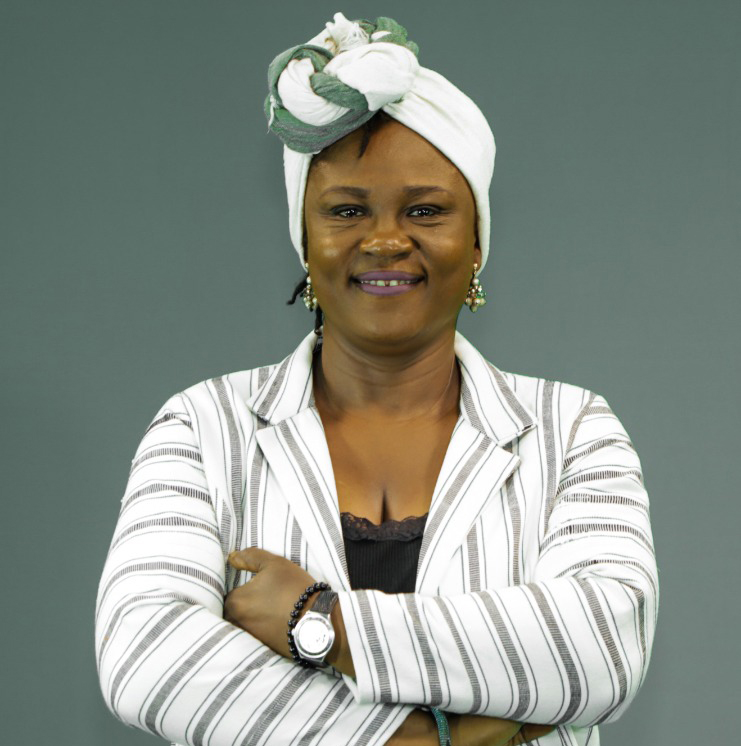 Célia D'Almeida
Landendirecteur, NIMD Mali
Meer lezen
Célia D'Almeida
Landendirecteur, NIMD Mali
Meer lezen
Dédé Faconam d'Almeida, beter bekend als Célia, heeft meer dan 20 jaar ervaring als journalist, mediadeskundige en specialist in communicatie voor ontwikkeling. In die tijd heeft ze een diepgaande expertise en een breed netwerk opgebouwd door samen te werken met Malinese kranten en internationale media over onderwerpen als economie, mensenrechten en duurzame ontwikkeling. Ze is de oprichter van media- en trainingsadviesbureau ODEKA, dat het informatieplatform "Rue14" leidt, gewijd aan mediatraining en burgerparticipatie.
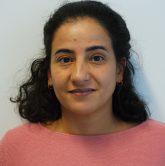 Salima Ahmadou
Programma- en kennisadviseur West-Afrika
Meer lezen
Salima Ahmadou
Programma- en kennisadviseur West-Afrika
Meer lezen
Salima Ahmadou is het aanspreekpunt in Den Haag en werkt samen met het Mali-team.

Dédé Faconam d'Almeida, beter bekend als Célia, heeft meer dan 20 jaar ervaring als journalist, mediadeskundige en specialist in communicatie voor ontwikkeling. In die tijd heeft ze een diepgaande expertise en een breed netwerk opgebouwd door samen te werken met Malinese kranten en internationale media over onderwerpen als economie, mensenrechten en duurzame ontwikkeling. Ze is de oprichter van media- en trainingsadviesbureau ODEKA, dat het informatieplatform "Rue14" leidt, gewijd aan mediatraining en burgerparticipatie.

Salima Ahmadou is het aanspreekpunt in Den Haag en werkt samen met het Mali-team.
Met wie we samenwerken
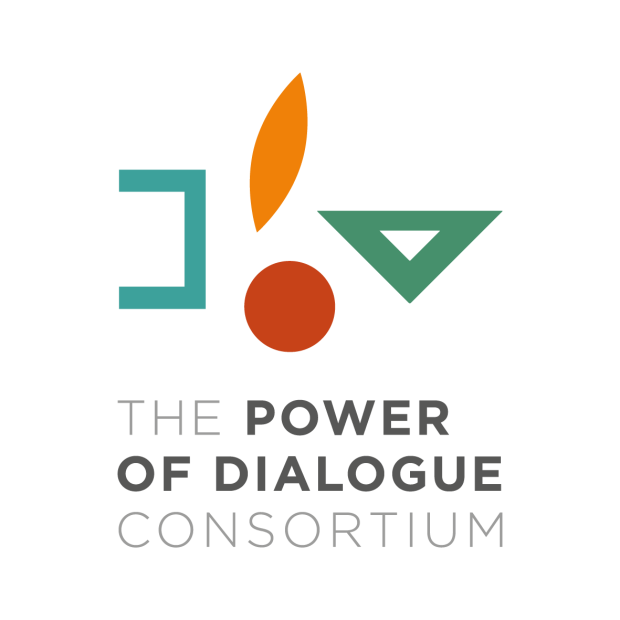
Ons werk in Mali wordt gefinancierd door het Nederlandse Ministerie van Buitenlandse Zaken in het kader van het De kracht van dialoog programma. Het Power of Dialogue consortium bestaat uit NIMD, Instituut Gorée, Akina Mama wa Afrikaen Internationaal centrum voor studies over de Middellandse Zeeen streeft naar een betere samenwerking tussen politieke en burgeractoren om deel te nemen aan verantwoordelijke politieke processen.

Onze school voor democratie en ons werk aan de integratie van onderzoek in besluitvorming worden gefinancierd door de Europese Unie.

 Facebook
Facebook LinkedIn
LinkedIn Twitter
Twitter